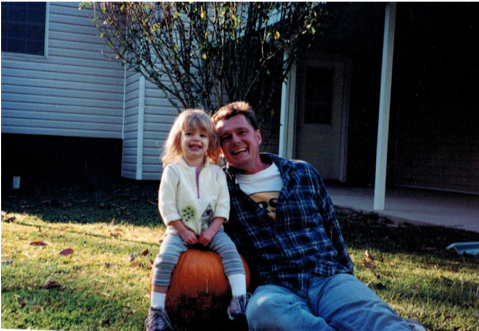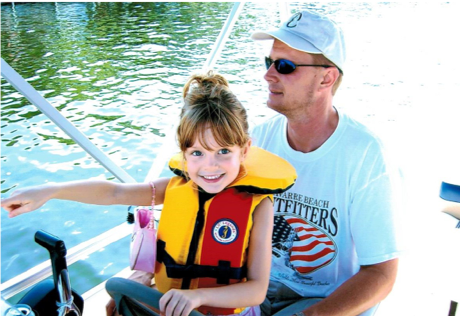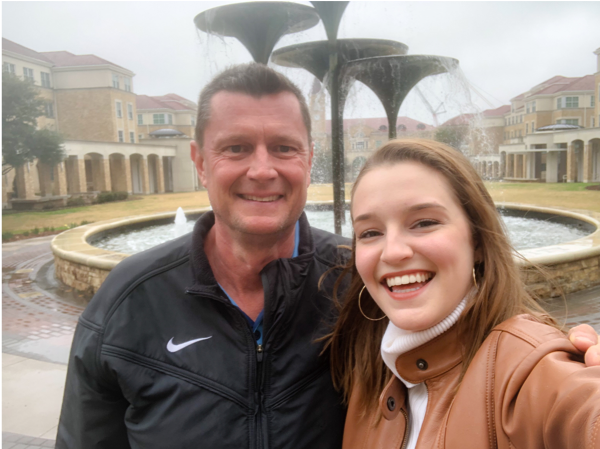Using the Role of Fathers to Promote Healing in Children with Histories of Trauma
by: Sarah Wayer

“The heart of a father is the masterpiece of nature.”
—Antoine François Prévost, Manon Lescaut
Growing-up, my family had a unique dynamic. In my family, my dad assumed the role of a stay-at-home dad while my mom took the role of the breadwinner. I remember many summer afternoons spent picking blueberries, ‘driving’ the tractor, or running daily errands together. My dad was the one who volunteered at church camps, picked us up from school, and helped with homework. That is not say that my mom was not involved. However, the first ten years of my life were marked by consistent paternal involvement. I didn’t realize how special those experiences were until I entered elementary school where I quickly learned my relationship with my dad was a rarity. It wasn’t until adulthood that I began to wonder how the connection with my dad might affect the development of my identity. This curiosity is what sparked my interest and research on fatherhood. According to the U.S. Census Bureau, it is estimated that one in four, or 19.7 million, children in America grow up without a father in the home. The sad reality is that, for many people, when it comes to the concept of a father, there is more trauma than security. Thankfully, there is always hope. Where there is hurt, there is an opportunity for healing. The research I’ve compiled and following suggestions are designed to support fathers as they develop relationships with their children and heal the wounds left in the wake of trauma.
Fathers, you have an incredible and unique role to play in the lives of your children. The research shows that fathers naturally empower their children to explore, take chances, be brave, and stand-up for themselves within the context of play. There is a beautiful balance between discipline and exploration found in the father-child relationship. Let me illustrate with an example:
A study conducted in France, observed fathers and mothers at a children’s swim class. Researchers noted that mothers were often in the water and spent more time within their children’s line of sight. In contrast, fathers often encouraged their children from behind or outside of the child’s view. Whether the children were in the care of the father or the care of the mother, they were safe. However, fathers were pushing their children to be brave and take initiative in unfamiliar situations.
For me, this was, both, fascinating and relatable. My dad was a disciplinarian, but he always pushed me to try new things, to explore the world, and to get a little messy in the process. Much like the father in the study, my dad stood behind and encouraged me to jump in to ‘deep end’ of life. I was always safe, but I had to be brave.
 I also thought this finding has important implications when considering the effect of a healthy father-child relationship and children with histories of trauma. For many of these children, they were robbed of a voice. For many of these children, fear marked their early years. For many of these children, shame has taken root and the confidence needed to explore the world is essentially non-existent. Therefore, I would argue, a relationship that promotes bravery, exploration, confidence, and gives voice is necessary to give back what trauma took.
I also thought this finding has important implications when considering the effect of a healthy father-child relationship and children with histories of trauma. For many of these children, they were robbed of a voice. For many of these children, fear marked their early years. For many of these children, shame has taken root and the confidence needed to explore the world is essentially non-existent. Therefore, I would argue, a relationship that promotes bravery, exploration, confidence, and gives voice is necessary to give back what trauma took.
So, this begs the question: How do we support the role of the father to bring healing to children who have histories trauma and broken relationships? Based on my compilation of research I believe there are two strategies fathers can use to build connection with their children. First, there is a need for paternal support groups to allow fathers to find community, process their histories, discuss struggles in parenting, and the effects of modern masculinity on the expectation of fatherhood. If they are not readily available, I highly recommend fathers seek support from other fathers. Studies are revealing that this support is an important reminder that you are not alone in your journey and this support provides a community of collective wisdom to problem-solve together. Secondly, evidence has shown that fathers seem to primarily connect through play. Based on this evidence, I say incorporate play into everything you do. Play communicates safety and creates a sense of shared joy. I encourage fathers to look for opportunities to challenge and encourage your child(ren) but remain attuned enough to know when play should cease, and care should be given.
 So, whether you are a biological father, foster father, adoptive father, or father figure, please know you are so important to the children in your care. Their relationship with you is unlike any other. I want to take a moment to honor and thank my father and fathers worldwide. Thank you for teaching me about dedication and determination so I know that when I fall, I will also rise again. Thank you for challenging me to step outside my comfort zone because you knew I had so much to learn. Thank you for making me brave by reminding me of how beautiful the world truly is. Thank you for being proud of me. I wouldn’t be who I am today without your care and commitment to me.
So, whether you are a biological father, foster father, adoptive father, or father figure, please know you are so important to the children in your care. Their relationship with you is unlike any other. I want to take a moment to honor and thank my father and fathers worldwide. Thank you for teaching me about dedication and determination so I know that when I fall, I will also rise again. Thank you for challenging me to step outside my comfort zone because you knew I had so much to learn. Thank you for making me brave by reminding me of how beautiful the world truly is. Thank you for being proud of me. I wouldn’t be who I am today without your care and commitment to me.
Sarah is a DETR Master’s student at the Karyn Purvis Institute of Child Development at Texas Christian University due to graduate in August 2020. Sarah is a firm believer in the healing power of relationships and principles found in TBRI. Through her mission work in eSwatini, Africa and participation in TBRI camps, she has witnessed the changes families experience when provided with trauma-informed care and support. Sarah has a passion for working with families and children who have experienced trauma and hopes to, one day, facilitate TBRI implementation on global scale.
Research References:
U.S. Census Bureau. (2018). Living arrangements of children under 18 years old: 1960 to present. Washington, D.C.: U.S. Census Bureau
Study as cited in: Paquette, D. (2004). Theorizing the father-child relationship: Mechanisms and developmental Outcomes. Human Devlopment, 47(4), 193-219. 10.1159/000078723
This is so good and full of truth! Thanks for sharing it.
You will have to make it an opening statement to your book one day. This is great, thanks for sharing… I’ll be reading it…
Excellent summary Sarah. I have always been in awe of how your Mom and Dad shared parenting. Your Dad is priceless, but I’m sure you know that.